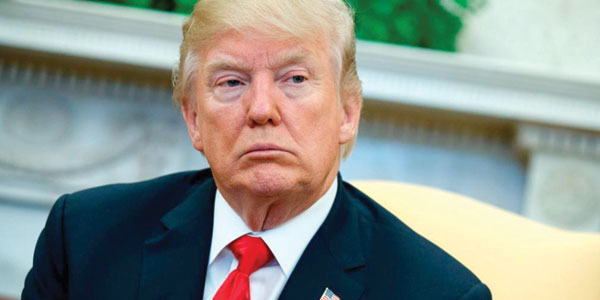
By Jorge Ramos
The United States under President Donald Trump reminds me a lot of a tug of war. This was traditionally a children’s game, but nowadays the term is commonly used to describe a “decisive contest; the real struggle or tussle; a severe contest for supremacy,” according to the Oxford English Dictionary. In a tug of war, ties are rare, and the main objective is to pull on your end of the rope until the other team gives up and is dragged over to your side.
We’re engaged in a tug of war these days in the United States, but it’s hardly a game. There are many lives at stake.
On one side is Trump- who refuses to represent all Americans – and the almost 63 million people who voted for him, whom he favors. On the other side are the 65 million people who didn’t vote for him, and they are not switching sides. In fact, the differences are increasingly obvious and painful.
Meanwhile, Congress is paralyzed. Bipartisan legislation is increasingly rare. This means that any changes to our laws must be made through an executive order or a Supreme Court decision.
Yet even the Supreme Court, a bastion of American civility and one of the nation’s most respected institutions, is deeply divided. Its recent ruling, in a 5-4 vote, to uphold Trump’s ban on people from certain Muslim-majority nations seeking to enter the United States was evidence of the divisiveness. The ban constitutes “an unrelenting attack on the Muslim religion and its followers,” Justice Sonia Sotomayor wrote in her dissent. But her argument was ineffective.
Banning people from entering the country because of their religion or place of birth is, simply put, discriminatory.
Trump’s followers remain anxious because the demographics of the country are changing. By 2044, we will all be part of a minority, and Trump supporters see this as evidence that the country is being invaded by immigrants. This is a complete lie, of course. There is no invasion. The number of unauthorized immigrants in this country has remained steady for a decade, at about 11 million. But the official narrative used to intensify peoples’ fear of immigrants has been cruel and unrelenting.
I would never have imagined that the U.S. government would separate thousands of children from their parents in order to discourage unauthorized immigration. Why make kids pay for the actions of their parents? The images of minors, alone and caged in, are dreadful; the recordings of their cries are heartbreaking. And the defense of these actions remains focused on the notion that officials had no option but to enforce this cruel policy to prevent more gangsters, rapists and drug dealers from entering the country.
But resistance to Trump and his policies is growing. Activists from all over the country gathered in Brownsville, Texas, recently to support immigrant children who have been taken from their parents, and to make the rest of the country aware that Mexico’s drug violence has not infiltrated America’s border communities. On the opposite side of this story we have the survivors of the Parkland, Florida, high school shooting forcing a debate on firearms possession, while the “Dreamers” are pushing to change immigration policy.
Amid this activism, new leaders and opposition figures have emerged under the radar. A few weeks ago, Alexandria Ocasio-Cortez, at only 28 years old, became one of the great hopes for the Democratic Party, quite literally overnight, when she defeated a longtime incumbent in a congressional primary. She is a member of a new generation of social activists who understand that being anti-Trump is not enough to win over voters. Concrete proposals to improve people’s lives must be made.
In the end, a president who insults groups of people, makes racist remarks, mocks people with disabilities, lies, separates babies from their mothers and puts families in pens cannot unite a country. On the contrary, he is the main source of our disunity and conflict.
This is our tug of war: extremes pulling from opposite sides, and consensus nowhere to be seen. We are living in the (Dis)United States of Trump.
__________________________________________________________________________________________
Estados (Des)Unidos de Trump
Estados Unidos, bajo el presidente Donald Trump, me recuerda tanto ese juego infantil en que dos equipos jalan los extremos de una cuerda. “Tug of war” le llaman en inglés. La traducción literal sería algo así como el jaloneo de la muerte. Casi nunca hay empate, y el propósito del juego es que el equipo contrario ceda o se cruce a tu lado. El problema es que en Estados Unidos esto no es un juego, y hay muchas vidas de por medio.
Está claro que Trump no gobierna para todos. Sólo lo hace para un grupito: los casi 63 millones que votaron por él. Pero más de 65 millones votaron en su contra, y no hay ninguna indicación que esos votantes estén cambiando de bando. Al contrario. Las diferencias son cada vez más patentes y dolorosas.
El Congreso en Washington está paralizado. No hay ninguna ley con apoyo bipartidista. Eso lo que significa es que cualquier cambio se tiene que dar por la fuerza, ya sea por una orden presidencial o por una decisión de la Corte Suprema de Justicia.
Hasta la principal Corte del país — bastión de la civilidad estadounidense y una de las instituciones más respetadas — tiene graves divisiones. La reciente decisión (con un voto de 5 a 4) que le permite a Trump prohibir la entrada de ciertos musulmanes a Estados Unidos, recibió un fuerte rechazo de la jueza Sonia Sotomayor. Se trata de un “avasallador ataque contra la religión musulmana y sus seguidores”, dijo. Pero de nada sirvió su argumento.
Prohibir la entrada de personas por su religión o por su lugar de nacimiento es, simplemente, discriminación. La política oficial de Estados Unidos es rechazar a los que son distintos (aunque se vista como una medida antiterrorista).
Los seguidores de Trump están muy nerviosos. El color del país está cambiando. Para el 2044, todos seremos parte de una minoría. Pero para acrecentar esta ansiedad demográfica, les han vendido el cuento de que el país está siendo invadido por inmigrantes, cosa que es absolutamente falsa. No hay ninguna invasión; el número de indocumentados se ha mantenido estable en 11 millones por una década. Pero la narrativa oficial para reforzar ese miedo ha sido cruel y despiadada.
Jamás me imaginé que Estados Unidos separaría a miles de niños de sus padres para desalentar la inmigración indocumentada. ¿Qué culpa tienen esos niños? Las imágenes de menores de edad, solos y en jaulas, son de horror. Y las grabaciones de sus sollozos rompen el corazón. Todo para sugerir que Estados Unidos se vio obligado a imponer estas políticas para evitar que lleguen más pandilleros, violadores y traficantes.
Mientras todo esto ocurre, la resistencia a Trump y sus políticas crece. En el otro extremo tenemos a los sobrevivientes de la masacre escolar en Parkland, Florida, obligando a cambiar el debate sobre la posesión de armas de fuego, y a los “Dreamers” presionando para cambiar las política migratoria de Estados Unidos.
En Brownsville, Texas, hace poco, se reunieron activistas de todo el país para apoyar a los niños que habían sido separados de sus padres y para informarle al resto del país que en las poblaciones fronterizas no se ha colado la narcoviolencia que impera en México.
Bajo el radar, están surgiendo nuevos líderes y figuras de oposición. Alexandria Ocasio-Cortez, de sólo 28 años, se ha convertido — literalmente de la noche a la mañana — en una de las mayores esperanzas del partido Demócrata (y de cambio en un país donde pocos confían en los partidos políticos). Ella y una nueva generación de activistas y organizadores sociales han entendido que no basta con estar en contra de Trump. Es necesario hacer propuestas muy concretas para que la gente viva mejor.
Al final de cuentas, un presidente que insulta, que hace comentarios racistas, que se burla de personas con discapacidad, que miente, que separa a bebés de sus mamás y que enjaula a familias no puede unir a un país. Al contrario, él es el principal motivo de desunión y conflicto. Los extremos jalan para su lado y no parece haber ninguna posibilidad de consenso.
Estamos viviendo en los Estados (Des)Unidos de Trump.










